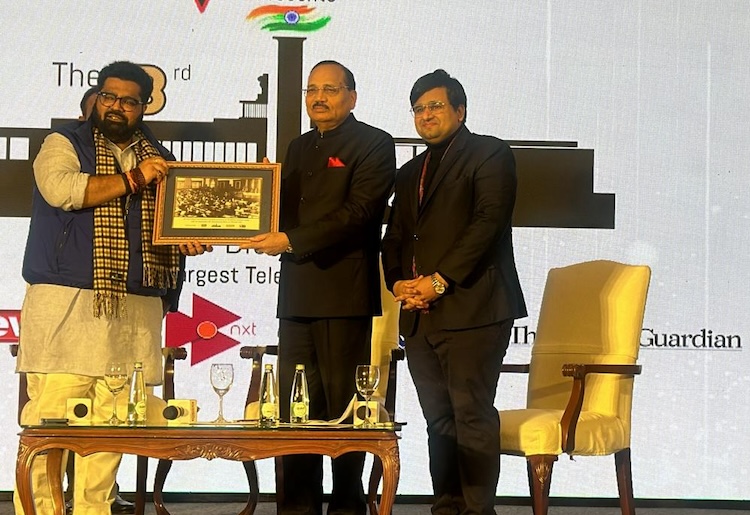MUMBAI: ITV Network’s NewsX’S Legally Speaking, televised legal platform, hosted the Third Law & Constitution Dialogue 2024 on 13 December 2024. Marking 75 years of the Indian Constitution, it brought together prominent legal experts, lawmakers, jurists, and thought leaders for insightful discussions on pressing legal and constitutional matters.
Union minister of law & justice Arjun Ram Meghwal spoke about the importance of the Indian Constitution and discussed the concept of "One Nation, One Election." Meghwal traced the origins of Constitution Day, initiated by prime minister Narendra Modi in 2015, to honor Dr. B.R. Ambedkar's legacy and celebrate the constitution's foundational role in India’s democracy.
In his keynote address, chief guest supreme court judge Surya Kant highlighted the changes introduced by the 2018 Amendment to the Specific Relief Act, 1963. Justice Kant discussed the legal and economic implications of the amendment, emphasizing its role in strengthening India’s position as a global economic powerhouse.
Key Panels and Discussions
Justice Sanjay Kishan Kaul addressed the long-standing tragedy of the Kashmiri pandit genocide, calling for official acknowledgment and a healing process. He stressed that while the community does not seek a return to the past, they expect recognition of the wrongs committed against them.
Veteran lawyer and Rajya Sabha MP Kapil Sibal joined editor-in-chief Rishabh Gulati for a thought-provoking discussion. Sibal advocated for global protection of minorities, specifically highlighting the plight of Hindu minorities in Bangladesh.
A session on the Places of Worship Act, 1991, witnessed a spirited debate among experts like former Patna high court chief justice Iqbal Ansari) and former union minister Mukhtar Abbas Naqvi. The panel deliberated on whether the act aligns with India’s secular fabric or hinders historical justice.
The issue of ‘bulldozer justice’ was addressed by BJP leader Sudhanshu Mittal, political analyst Tehseen Poonawalla and former Delhi DCP SN Srivastava. The question of whether the act of demolition is unconstitutional was addressed in a heated discussion, with the panelists concluding that justice delayed is justice denied.
The event featured a thought-provoking panel discussion titled “Will Delimitation Create a North-South Imbalance in Parliament?” Panelists, including DMK’s Kalanidhi Veeraswamy, BJD’s Sasmit Patra, and senior advocte P.P. Chaudhary explored the socio-political implications of delimitation.
Another session with member of parliament Karti Chidambaram, examined whether India requires more MPs in parliament. Chidambaram stressed, “Representation should reflect economic and social realities, not merely religion or caste. Pragmatic reforms are needed for effective governance.”

In a heated panel discussion, former chief election commissioner S.Y. Quraishi, Congress’ Supriya Shrinate and BJP member G.V.L. Narasimha Rao debated the implications of simultaneous elections.
A dialogue on Challenges to Women’s Reservation featured influential voices such as Swati Maliwal, Iqra Hassan, Jebi Mathers and Shubhrasthra. The panelists discussed the Women’s Reservation Bill’s implementation hurdles and its potential to transform Indian politics.
The growing menace of cybercrime was addressed in a panel featuring former DGP Goa Muktesh Chander, and cyber law expert Pawan Duggal .Discussions focused on balancing cybersecurity and constitutional freedoms.
Abhishek Singhvi examined the fundamental tenets and underlying principles of the Indian constitution, emphasising its resilience and adaptability in safeguarding democracy.
Former chief justice of the Punjab & Haryana high court Mukul Mudgal delved into the progress and challenges of sports governance in India.
Lok Sabha member Manish Tewari reflected on the success and shortcomings of the Indian Constitution over decades, exploring its impact on governance, citizens' rights, and evolving societal needs.
In a discussion with senior advocate Vivek Tankha and Former ASG Aman Lekhi, experts examined the changes in Indian criminal law, evaluating whether recent reforms address historical gaps in the system.
A panel featuring cyber technology expert Subimal Bhattacharjee, the Esya Centre’s Meghna Bal, former union minister K.J. Alphons, and member of parliament Kartikeya Sharma explored the potential risks and challenges AI poses to governance, politics, and the judiciary.
The day-long event featured 22 sessions, each addressing critical legal and constitutional issues. Topics ranged from “Bulldozer Justice” to “The Constitutionality of the Waqf Act”. The dialogue delved into the evolving nature of India’s justice system and the need for judicial and policy reforms.
 Follow Us
Follow Us





